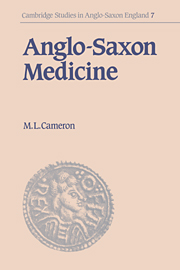Book contents
- Frontmatter
- Contents
- Preface
- Acknowledgements
- List of abbreviations
- 1 Introduction
- 2 Conditions for health and disease
- 3 Physician and patient
- 4 The earliest notices of Anglo-Saxon medical practice
- 5 Medical texts of the Anglo-Saxons
- 6 Compilations in Old English
- 7 Compilations in Latin
- 8 Latin works translated into Old English: Herbarium and Peri Didaxeon
- 9 Sources for Old English texts
- 10 Making a Leechbook
- 11 Materia medica
- 12 Rational medicine
- 13 Magical medicine
- 14 The humours and bloodletting
- 15 Surgery
- 16 Gynaecology and obstetrics
- 17 Conclusions
- Appendix 1 Quotations for ch. 10
- Appendix 2 Quotations for ch. 13
- Appendix 3 Quotations for ch. 14
- Appendix 4 Quotation for ch. 15
- Bibliography
- Index
17 - Conclusions
Published online by Cambridge University Press: 30 September 2009
- Frontmatter
- Contents
- Preface
- Acknowledgements
- List of abbreviations
- 1 Introduction
- 2 Conditions for health and disease
- 3 Physician and patient
- 4 The earliest notices of Anglo-Saxon medical practice
- 5 Medical texts of the Anglo-Saxons
- 6 Compilations in Old English
- 7 Compilations in Latin
- 8 Latin works translated into Old English: Herbarium and Peri Didaxeon
- 9 Sources for Old English texts
- 10 Making a Leechbook
- 11 Materia medica
- 12 Rational medicine
- 13 Magical medicine
- 14 The humours and bloodletting
- 15 Surgery
- 16 Gynaecology and obstetrics
- 17 Conclusions
- Appendix 1 Quotations for ch. 10
- Appendix 2 Quotations for ch. 13
- Appendix 3 Quotations for ch. 14
- Appendix 4 Quotation for ch. 15
- Bibliography
- Index
Summary
I hope that I have given enough quotations from their medical texts to allow readers to reach their own conclusions about the quality of Anglo-Saxon medicine. I will, however, present my own for consideration.
We are fortunate to have surviving to our time works representative of three levels of Anglo-Saxon medical literature. At the lowest level is Lacnunga which, as medicine, belongs to the least learned type of compilation. It is interesting that we still have this kind of collection with us today; my library contains more than one representative of the type compiled in the twentieth century. But although Lacnunga shows no medical expertise in its compilers and only a poor level of competence in either Old English or Latin, it is, for these very reasons, of the greatest value for showing us medical tradition at the level of the untrained and poorly educated practitioner who depended on spells and incantations as much as on potions and poultices for healing. Lacnunga gives us a picture of medicine at its lowest level.
Of the Old English works, Leechbook III is of special interest because it contains so much Anglo-Saxon medicine relatively uncontaminated by Mediterranean influences. It provides our only opportunity to get a glimpse of Northern European medical practice. It is interesting that, although it deals freely in amulets and charms, it presents on the whole a picture of a medical practice which relied primarily on rational treatments and lets us see that other European cultures than those of Greece and Rome could carry on a rational approach to illness.
- Type
- Chapter
- Information
- Anglo-Saxon Medicine , pp. 185 - 186Publisher: Cambridge University PressPrint publication year: 1993

